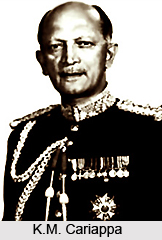 Kodandera Madappa Cariappa, or K.M. Cariappa was born on 28th January 1899, at Shanivarsanthe in erstwhile Coorg (present-day Kodagu, Karnataka), which was centrally administered by the British. His father Kodandera Madappa was a revenue official at Madikeri and the family lived in a house named Lime Cottage. Cariappa had three brothers and two sisters, all of whom were brought up strictly under the loving care of their parents, especially the father.
Kodandera Madappa Cariappa, or K.M. Cariappa was born on 28th January 1899, at Shanivarsanthe in erstwhile Coorg (present-day Kodagu, Karnataka), which was centrally administered by the British. His father Kodandera Madappa was a revenue official at Madikeri and the family lived in a house named Lime Cottage. Cariappa had three brothers and two sisters, all of whom were brought up strictly under the loving care of their parents, especially the father.
K.M. Cariappa lost his parents at an early age. Since Cariappa`s early life, he had learned the meaning of discipline and determination. Long after his parents were gone, the promising son stuck on to his routine of praying to their images, the photographs, as much as he prayed to Kaveri Amma, the river goddess Kaveri. At every tender or crucial moment of his life, Cariappa looked up to them for inner strength and inspiration. Placed right below these photographs were the bust of a `jawan` and it could easily be understood what all this meant to him. Cariappa was so staunch in his faith and beliefs that nothing could ever make him stoop before anyone to gain his ends. Being sure of himself and his abilities, he could always carry the day before him. India was lucky to have such a person at the top rung of the Army when the promise of freedom dawned on the horizon.
From an early life, Cariappa was admitted to school, taught by English men. Along with the guidance of his parents, young Cariappa was lucky to be taught by good British teachers. He found himself encouraged by his Head Master W. H. Whitworth and another teacher S. I. Steele. This early discipline became deeply ingrained; Cariappa understood the importance of immaculate dressing and appropriate conduct for every occasion. He liked to play hockey and cricket and excelled in both. His favourite subjects in school were Mathematics and Drawing, especially making caricatures. Cariappa was affectionately called as `Chinna` by his relatives, owing to his docile behaviour. His early life also saw him grow attached to music and a special knack for hand tricks.
While studying at Presidency College, Madras (now Chennai), K.M. Cariappa came to know that the British had decided to take Indians for the King`s Commission in the army. But Cariappa`s district of Kodagu was allotted just a single vacancy out of fifty meant for other districts of the country. Moreover, preference for selection was to be given to the princes of the states besides some rich people who had proved their loyalty. Cariappa convinced his father that he should be taken to meet the Commissioner of the district. He faced stiff competition from a rich man`s son but as destiny would have it, the Commissioner was impressed with Cariappa`s interview and decided to give preference to him. It thus becomes quite clear that since his early life, Cariappa was strongly attached to armed forces and fight for a cause, which never did make him deter under any circumstances. His brilliance outshone even British army officers and Cariappa was proudly selected to a Class I Army officer, ousting every rich `native`.




















